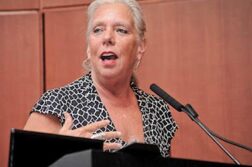Published in: September-October 2015 issue.
RONNIE GILBERT, the bold and provocative female voice in the Weavers folk quartet (which also included Pete Seeger, Lee Hays, and Fred Hellerman) died on Saturday, June 6, 2015.
Ruth Alice Gilbert was born in Brooklyn on September 7,1926. Her parents were Jewish immigrants from Eastern Europe, and her mother was a card-carrying Communist. She grew up believing in the need for all of us to strive to make this world a better and more just place for all people.
For Ronnie Gilbert, music was the language of liberation, and her participation in the Weavers provided her with the context in which she could give voice to her politic causes.





